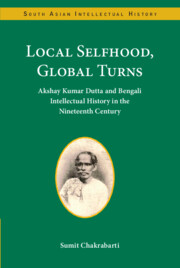 Local Selfhood, Global Turns
Local Selfhood, Global Turns Published online by Cambridge University Press: 30 June 2023
In the previous chapter I have argued how the major templates of post-colonial historiography have largely engaged with figures who could be drawn larger than life with broad brushstrokes, and how the categorical divisions within historiographic practice have led historians to formulate ideological divisions (such as ‘liberal’ and ‘cultural’) to make sense of the complex reactions to imperial governance in nineteenth-century India and Bengal. Both these tactics – of nominating and focusing on important ideologues on the one hand and designing binary or incommensurate ideological templates on the other – were perhaps necessary to comprehend, in a generalized sense, the structure of post-colonial historical practice. Such broad templates would also consolidate a framework that would typically register and establish the reactions or responses to the colonial project of transposing its narrative of modernity and progress, and set off a critique that could also be understood as a narrative within the disciplinary formations of historiography. If one were to follow the development of post-colonial Indian historiography, it would not be difficult to discern such a claim towards a narrative, either as a derivative discourse or a global engagement or as a result of inevitable or incidental entanglements, to name a few. I have expressed a measured scepticism about the tentatively closed templates that would discount the contingent nature of ideology critique and the fluidity of cultural resistance through praxis that is possible within a colonized space that has deep traditional roots and those that try to re-articulate the notion of the historical narrative through a lens of lived experience within the samaj or indigenous society. More often than not, there is a certain performative spin to the articulation or representation of identity even within closed and well-defined contexts that engenders the notion of a slippage or a spillage. Such slippage or spillage may not always be due to excess, but due to a leakage or a gap within the set discursive rhetoric of a narrative. The performative moment within indigenous polity is capable of such complexities, whereby an act of continuous mimesis or mimicry of the master-narrative might surreptitiously provoke that contingent moment of alterity by which to identify or posit the question of selfhood.
To save this book to your Kindle, first ensure [email protected] is added to your Approved Personal Document E-mail List under your Personal Document Settings on the Manage Your Content and Devices page of your Amazon account. Then enter the ‘name’ part of your Kindle email address below. Find out more about saving to your Kindle.
Note you can select to save to either the @free.kindle.com or @kindle.com variations. ‘@free.kindle.com’ emails are free but can only be saved to your device when it is connected to wi-fi. ‘@kindle.com’ emails can be delivered even when you are not connected to wi-fi, but note that service fees apply.
Find out more about the Kindle Personal Document Service.
To save content items to your account, please confirm that you agree to abide by our usage policies. If this is the first time you use this feature, you will be asked to authorise Cambridge Core to connect with your account. Find out more about saving content to Dropbox.
To save content items to your account, please confirm that you agree to abide by our usage policies. If this is the first time you use this feature, you will be asked to authorise Cambridge Core to connect with your account. Find out more about saving content to Google Drive.